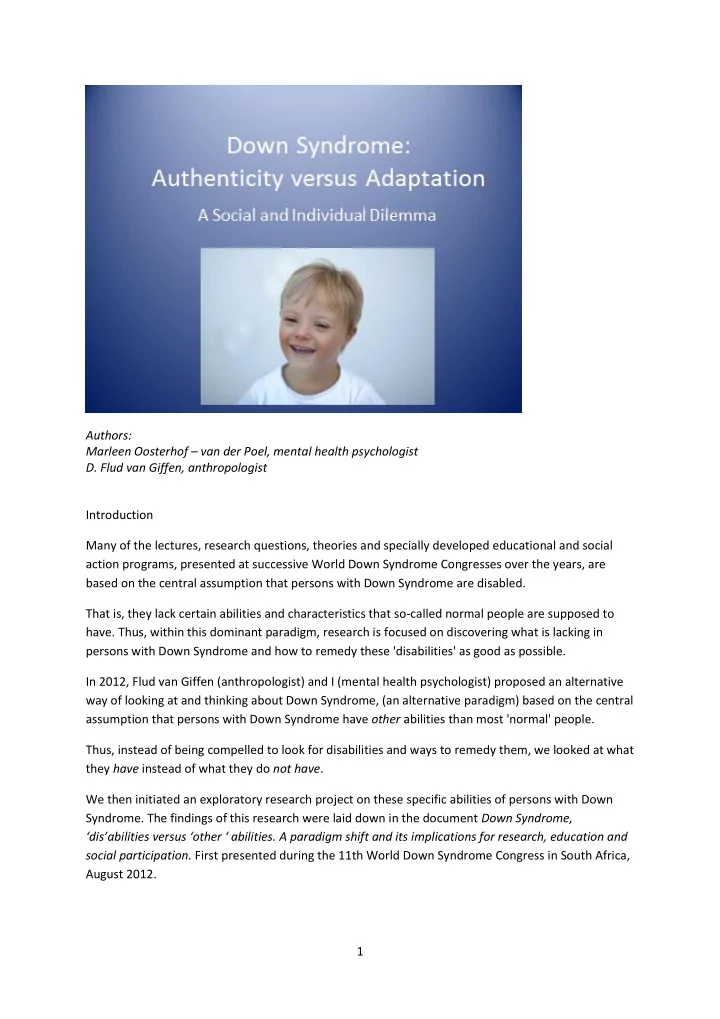

Authors: Marleen Oosterhof – van der Poel, mental health psychologist D. Flud van Giffen, anthropologist Introduction Many of the lectures, research questions, theories and specially developed educational and social action programs, presented at successive World Down Syndrome Congresses over the years, are based on the central assumption that persons with Down Syndrome are disabled. That is, they lack certain abilities and characteristics that so-called normal people are supposed to have. Thus, within this dominant paradigm, research is focused on discovering what is lacking in persons with Down Syndrome and how to remedy these 'disabilities' as good as possible. In 2012, Flud van Giffen (anthropologist) and I (mental health psychologist) proposed an alternative way of looking at and thinking about Down Syndrome, (an alternative paradigm) based on the central assumption that persons with Down Syndrome have other abilities than most 'normal' people. Thus, instead of being compelled to look for disabilities and ways to remedy them, we looked at what they have instead of what they do not have . We then initiated an exploratory research project on these specific abilities of persons with Down Syndrome. The findings of this research were laid down in the document Down Syndrome, ‘dis’abilities versus ‘other ‘ abilities. A paradigm shift and its implications for research, edu cation and social participation. First presented during the 11th World Down Syndrome Congress in South Africa, August 2012. 1
Paradigm shift Dominant paradigm Alternative paradigm Basis assumption: Basic assumption: Persons with Down Syndrome persons with Down Syndrome lack certain abilities and characteristics has special abilities that ‘normal’ that ‘normal’ people have people do not have Focus on disabilities and ways Focus on detection of special abilities to remedy them and ways to develop them Authenticity Adaptation In that paper we discussed 11 abilities, all so-called ‘being - oriented’ characteristics. Our presentation today builds on and expands this theoretical framework and research, and discusses the results of a follow-up exploratory enquiry. We asked our 60 respondents to study the basic 2012 document and answer a set of questions about their experiences with the ‘other’ abilities of their own child/pupil. The following list shows the percentages of respondents identifying/recognizing the ‘other’ talents. The time is too short to attend all these talents. I choose only the numbers 7,8,9 and 10 to explain. 2
7. They are sensitive persons, who are really feeling atmospheres. This ability belongs to the authenticity of people with Down Syndrome according to 95% of the respondents. Reading the initial 2012 paper, helped them also to recognize this ability. How to recognize? Young children can start to cry when others are crying or are sad. Or: (We promised our respondents anonymity, so the quotes do not directly relate to the persons in the pictures) 3
How it appears in adolescents and elderly: smiling and relaxing in good atmosphere. Withdrawing or oppositional behavior in restless atmosphere. It goes well with them if you are just as sensitive and if you mention that you notice the changes in atmosphere. Previous opposite, withdrawing or compulsive behavior then disappears. Most respondents agree that it takes them a lot of time to acquire this sensitivity. It is also a serious dilemma for the person with Down Syndrome. 4
And are there enough people who are able to reassure them by specifically naming the changes in atmosphere? Advice: Do recognize their sensitivity as a specific ability and know how to reassure them if necessary. 8. This ability is part of their authenticity for 85% of the respondents. Persons with Down Syndrome comprehend non-verbal communication very well and far better than most of us. 50% of the respondents explain this ability as telepathy or sixth sense: no words or only a few are enough for them to understand a whole situation. 5
Some other quotes: 6
35% of the respondents do not call this ability telepathy. However, they confirm that persons with Down Syndrome comprehend language better through a combination of gestures, pictures and exemplary behavior . 7
This brings us to dilemmas and implications for education. Advice: Do not assume beforehand that they are not intelligent enough, perhaps wé are not focused enough for teaching them in a clear and unambiguous non-verbal way. 8
9. 70% of the respondents recognize their special ability to learn by observing, doing and experiencing, using logics of feeling instead of logics of mental thinking. Quotes. 9
10
10. Recognized as authenticity: 80%. Their tempo of doing things has a specific quality that we do not have in the same intensity. They can very well be in the here and now and can experience little things in many nuances. Afterwards they often repeat and re-experience these moments and are thus developing deeper feeling qualities. 11
12
This means that persons with Down and their parents and caretakers live in a society with a lot of time pressure, which creates a lot of frustrations and stress. Another example mentioned by one of our respondents is the situation of a person with Down Syndrome who during meals focuses on eating only in the here and now. And withdraw himself after eating for re-tasting his meal. This may look maladjusted and even antisocial if the time-orientation of a person with Down Syndrome is not properly understood. 13
Advice: Try to understand and honor this ability. Let them take their own time. It will be healthy for all of us. Contact: Marleen Oosterhof – van der Poel, Netherlands marleen.oosterhof@gmail.com 14
Recommend
More recommend